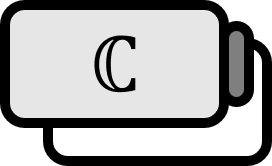Improper Integrals of Approach Functions
Buildup 1
The biggest problem when integrating a multivalued function is that the function value can change unexpectedly when the path encounters a branch cut. When integrating such a function, one uses the same trick as before to make the path circumvent the branch cut.

Considering the representative multivalued function, log $\log$, with the negative real axis as the branch cut and the origin as the branching point, one can imagine a path like the one above. Then, $$ R \to \infty \\ r \to 0 $$ while $L_{1}$ and $L_{2}$, as it approaches the negative real axis, it becomes possible to use the Residue Theorem over the entire complex plane. At first glance, it might seem too good to be true, but this powerful idea mobilizes all the methods learned so far.
Example 1
As an example, let’s calculate the value of $\displaystyle \int_{0}^{ \infty } {{\text{Log} x} \over {x^2 + a^2}} dx$.
Solution
Let’s set the integration path $\mathscr{C}$ as shown in the figure below.

Then, for the integrand $\displaystyle f(z) := {{\log z } \over {z^2 + a^2}}$, $$ \int_{\mathscr{C}} f(z) dz = {\color{red} \int_{\Gamma} f(z) dz } + \int_{L_{0}} f(z) dz + \color{blue} { \int_{\gamma} f(z) dz } + \int_{r}^{R} f(x) dx $$ substituting $L_{0}$ with $z = \rho e^{ i \theta }$ on $$ \int_{\mathscr{C}} f(z) dz = \int_{ R }^{r} { {(\text{Log} \rho + i \theta ) e^{i \theta } } \over {\rho^2 e^{2 i \theta } +a^2} } d \rho + {\color{red} \int_{\Gamma} f(z) dz } + \color{blue} { \int_{\gamma} f(z) dz } + \int_{r}^{R} {{\text{Log} x } \over {x^2 + a^2}} dx $$ As $\theta$ gets closer to $\pi$, and $L_{0}$ approaches the negative real axis, by applying $\theta \to \pi$ we get $$ \int_{\mathscr{C}} f(z) dz = \int_{ R }^{r} { { -( \text{Log} \rho + i \pi ) } \over {\rho^2 +a^2} } d \rho + {\color{red} \int_{\Gamma} f(z) dz } + \color{blue} { \int_{\gamma} f(z) dz } + \int_{r}^{R} {{\text{Log} x } \over {x^2 + a^2}} dx $$
Diverging Semicircular Complex Path Integral: If function $f$ is continuous on a semicircle $ \Gamma $ with radius $R$ and centered at $0$ and if $\displaystyle \lim_{z \to \infty } z f(z) = 0$, $$\lim_{R \to \infty} \int_{\Gamma} f(z) dz = 0$$
Meanwhile, $$ \lim_{z \to \infty} z f(z) = \lim_{z \to 0} {{1} \over {z}} f(1/z) = \lim_{z \to 0} {{- \text{Log} z } \over { 1/z + a^2 z }} = \lim_{z \to 0} {{ - z } \over {a^2 z^2 -1 }} = 0 $$ thus, $$ \lim_{R \to \infty} {\color{red} \int_{\Gamma} f(z) dz } = 0 $$
Contracting Semicircular Complex Path Integral: If function $f$ is continuous on a semicircle $ \gamma $ with radius $r$ and centered at $0$ and if $\displaystyle \lim_{z \to 0 } z f(z) = 0$, $$\lim_{r \to 0} \int_{\gamma} f(z) dz = 0$$
And, $$ \lim_{z \to 0} z f(z) = \lim_{z \to 0} {{ \text{Log} z } \over { z + a^2 / z }} = \lim_{z \to 0} {{ 1 / z } \over { 1 - a^2 / z^2 }} = 0 $$ thus,
$$ \lim_{r \to 0 } \color{blue} { \int_{\gamma} f(z) dz } = 0 $$ Therefore, by taking $r \to 0$ and $R \to \infty$ we get $$ \begin{align*} \int_{\mathscr{C}} f(z) dz =& \int_{ \infty }^{0} { { -( \text{Log} \rho + i \pi ) } \over {\rho^2 +a^2} } d \rho + \int_{0}^{\infty} {{\text{Log} x } \over {x^2 + a^2}} dx \\ =& \int_{ 0}^{ \infty } { { \text{Log} \rho } \over {\rho^2 +a^2} } d \rho + \int_{ 0}^{ \infty } { { i \pi } \over {\rho^2 +a^2} } d \rho + \int_{0}^{\infty} {{\text{Log} x } \over {x^2 + a^2}} dx \\ =& 2 \int_{0}^{\infty} {{\text{Log} x } \over {x^2 + a^2}} dx + i \int_{ 0}^{ \infty } { { \pi } \over {\rho^2 +a^2} } d \rho \end{align*} $$
Residue Theorem: Let the analytic function $f: A \subset \mathbb{C} \to \mathbb{C}$ have a finite number of singularities $z_{1} , z_{2} , \cdots , z_{m}$ within a simple closed path $\mathscr{C}$. Then, $$\int_{\mathscr{C}} f(z) dz = 2 \pi i \sum_{k=1}^{m} \text{Res}_{z_{k}} f(z)$$
By the Residue Theorem, $$ \int_{\mathscr{C}} f(z) dz = 2 \pi i \text{Res}_{a i} f(z) = 2 \pi i {{\text{Log} a i } \over {2 a i}} = \pi {{\text{Log} a + i {{\pi} \over {2}} } \over {a}} = {{ \pi \text{Log} a } \over {a}} + { i {{\pi^2} \over {2a} }} $$ Summarizing, $$ 2 \int_{0}^{\infty} {{\text{Log} x } \over {x^2 + a^2}} dx + i \int_{ 0}^{ \infty } { { \pi } \over {\rho^2 +a^2} } d \rho = {{ \pi \text{Log} a } \over {a}} + { i {{\pi^2} \over {2a} }} $$ Taking only the real part from the above equation gives, $$ \int_{0}^{\infty} {{\text{Log} x } \over {x^2 + a^2}} dx = {{ \pi \text{Log} a } \over {2a}} $$
